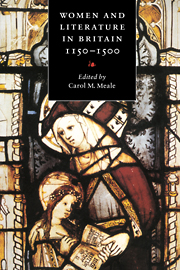Book contents
- Frontmatter
- Contents
- List of illustrations
- List of abbreviations
- Chronology: women and literature in Britain, 1150–1500
- Introduction
- 1 The power and the weakness of women in Anglo-Norman romance
- 2 Women as lovers in early English romance
- 3 Mothers in Middle English romance
- 4 ‘Clerc u lai, muïne u dame’: women and Anglo-Norman hagiography in the twelfth and thirteenth centuries
- 5 Women in No Man's Land: English recluses and the development of vernacular literature in the twelfth and thirteenth centuries
- 6 ‘Women talking about the things of God’: a late medieval sub-culture
- 7 ‘… alle the bokes that I haue of latyn, englisch, and frensch’: laywomen and their books in late medieval England
- 8 Women authors and women's literacy in fourteenth- and fifteenth-century England
- 9 Women and their poetry in medieval Wales
- Further reading
- Index of manuscripts
- Index of names and titles
9 - Women and their poetry in medieval Wales
Published online by Cambridge University Press: 09 November 2009
- Frontmatter
- Contents
- List of illustrations
- List of abbreviations
- Chronology: women and literature in Britain, 1150–1500
- Introduction
- 1 The power and the weakness of women in Anglo-Norman romance
- 2 Women as lovers in early English romance
- 3 Mothers in Middle English romance
- 4 ‘Clerc u lai, muïne u dame’: women and Anglo-Norman hagiography in the twelfth and thirteenth centuries
- 5 Women in No Man's Land: English recluses and the development of vernacular literature in the twelfth and thirteenth centuries
- 6 ‘Women talking about the things of God’: a late medieval sub-culture
- 7 ‘… alle the bokes that I haue of latyn, englisch, and frensch’: laywomen and their books in late medieval England
- 8 Women authors and women's literacy in fourteenth- and fifteenth-century England
- 9 Women and their poetry in medieval Wales
- Further reading
- Index of manuscripts
- Index of names and titles
Summary
Whereas in England and North America much of the pioneering work of listing, identifying and surveying the literature composed by women in the past was undertaken in the 1970s, progress has been far slower in Wales. The possible reasons are many: the slower spread of feminist ideas, perhaps, in the Welsh-speaking community, where traditional gender roles are different from those in other countries of the British Isles, and the under-representation of women (or men interested in women's literature) in the academic establishment. Although the basic research tools were at hand, notably the Mynegai i farddoniaeth gaeth y llawysgrifau (a first-line index to poetry in the strict metres preserved in Welsh manuscripts), no attempt was made until the mid 1980s even to list the women poets active before 1800. Research in the field of women's poetry in Welsh is still, therefore, in its infancy. The poetry itself is almost entirely unpublished, there are no proper editions of women's poetry earlier than the works of the eighteenth-century hymnist Ann Griffiths, and only in the last few years have a few examples of criticism appeared. Women's poetry in the medieval and modern periods is still marginalised, as witness the continuing tendency to exclude women poets from anthologies.
A few examples may have crept in by the back door, however. The Oxford Book of Welsh Verse, for example, contains a number of hen benillion (traditional folk-verses).
- Type
- Chapter
- Information
- Women and Literature in Britain, 1150–1500 , pp. 183 - 201Publisher: Cambridge University PressPrint publication year: 1993
- 7
- Cited by



